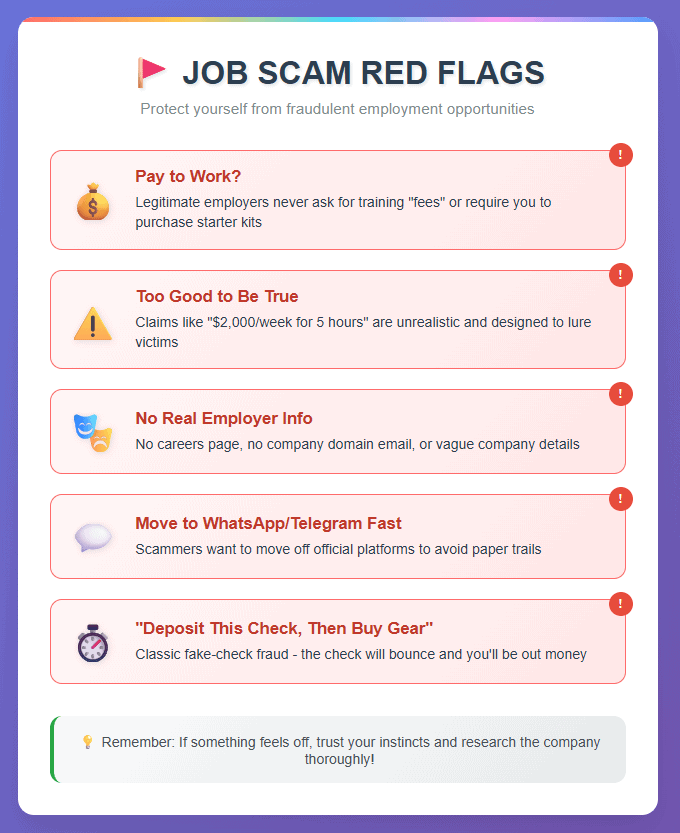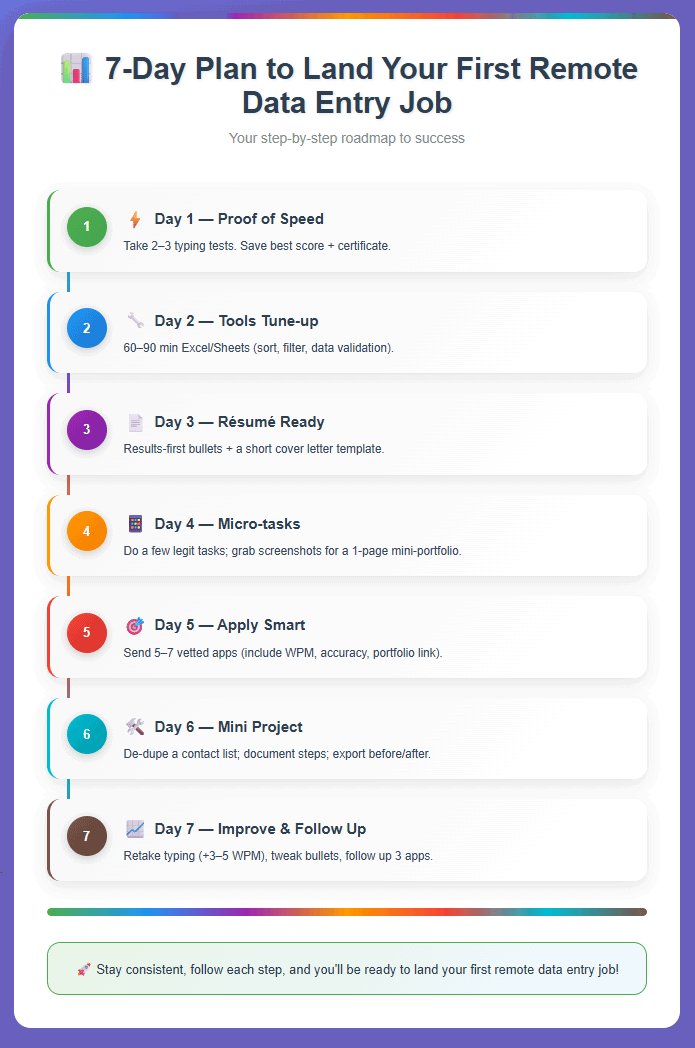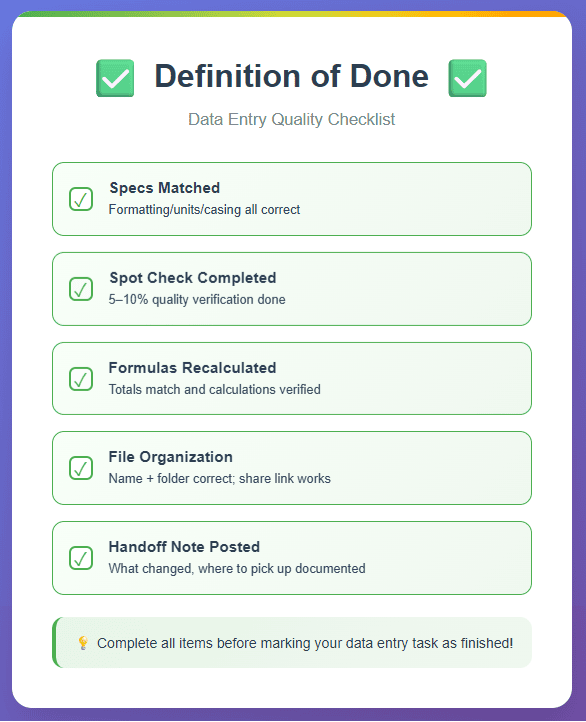People search for data entry jobs from home more than almost any other work-from-home job. Why? Because they’re easy to get started with. No degree. No fancy resume. Just solid typing, the ability to follow directions, and staying organized.
The money isn’t amazing, but it’s steady. Most beginners earn around $15-$22 an hour. Some niche areas pay more, like medical records or finance data. For students, new grads, or anyone looking for a side hustle, that can cover bills or stack on top of other income.
The hardest part? Figuring out what’s real. Companies like Remote.co and Upwork are usually legit, though you won’t get rich fast with them. On the flip side, scams are everywhere. The Federal Trade Commission warns about ads that ask for upfront fees, promise thousands a week, or don’t list clear job details. If it feels “too good to be true,” it probably is.
For a lot of people, data entry jobs at home are still the first step into fully remote work. They are flexible, reliable, and can lead to other administrative or data-focused jobs once you’ve got some experience under your belt.
What Data Entry Jobs at Home Actually Are
At their core, data entry jobs at home are simple. You take information from one place and enter it into another, spreadsheets, databases, CRMs, or even medical record systems. That’s basically it… It’s straightforward, but it has to be done right.
There are a few different types of remote data entry jobs at home. Some are general clerical work, updating mailing lists, logging survey responses, cleaning up spreadsheets. Others ones can be more specialized: medical data, legal documents, finance reports, or research coding. The more specialized remote data entry jobs usually pay better, but they also expect more accuracy.
So, what do these employers really want? Accuracy is number one. A typo can mess up entire records. The faster you work, obviously the more projects you finish. So, speed is second most important. Most jobs will have you working in Excel or Google Sheets, so being comfortable with them really helps. Some companies also use CRMs like Salesforce, so if you’ve already picked it up, it’ll make you stand out.
Most data entry jobs at home start at entry-level, with simple and straightforward onboarding. You don’t need to be an expert out the gate. If you can type accurately, follow formatting rules, and pay attention to detail, you can get started pretty quickly.
Average Pay and Workload
For most entry-level data entry jobs at home, the pay falls in the $15-$22 per hour range. It’s on par with other starter remote jobs. Specialized work, like medical billing, insurance claims, or legal data entry can pay more, sometimes pushing into the $25-$30+ per hour bracket once you’ve built up some experience.
The way you’re paid can widely vary. Some companies stick to hourly wages. Others will pay you by project or by the number of entries you complete. Project-based jobs reward people who are fast and accurate, because the quicker you finish, the higher your effective rate is. A smaller share of listings are full-time jobs with benefits, though most opportunities are still part-time or contract-based.
Certain factors can really move the needle on pay:
- Speed: Faster typing means more completed work.
- Accuracy: Mistakes cost clients money, so precision can get you repeat contracts.
- Volume: Being able to take on more keeps your schedule full.
- Specialization: Work in healthcare or finance usually pays better. The data is more sensitive, accuracy is paramount, and employers are willing to spend more to get it right.
Workload varies, too. A side-hustler might only log a few hours a week. A full-time remote hire can spend the entire day processing records. A lot of people pick data entry jobs at home because the schedule is flexible. The trade-off is that the pay isn’t always steady. How much you make depends on how many projects are available and how much you want to take on.
Where to Find Legit Data Entry Jobs at Home
One of the hardest parts about data entry jobs at home isn’t the work itself; it’s sorting out what’s real from what’s a scam. Legitimate remote data entry companies will never ask you to pay upfront for “training” or “starter kits.” The FTC has warned repeatedly about fake data entry postings that promise thousands a week for just a few hours of typing. If it sounds too good to be true, forget the old saying, just assume it is.
Unfortunately, a lot of jobseekers still fall for the trap. Scammers know how to mimic every bit of the hiring process, and they sound convincing. They’ll prey on anyone ready to start a data entry job from home… For example, in May 2024, North Carolina A&T student A. D. accepted what looked like a legitimate research/data job. She was sent a $2,400 “equipment” check and told to wire the funds to a vendor; when the check bounced, she was left owing the money. No reimbursement, no job.

Image by: The Diversity Employment Team—Save this for later!
So where should you look? Start with trusted job search websites that actually screen their listings. Even better, try a diversity job board like DiversityEmployment.com. Not only will you find data entry jobs at home there; you’ll also see a wide range of other opportunities from employers who are serious about being equal opportunity employers. It’s a safer way to do your job hunting without getting buried in scam ads.
Need help spotting the real thing? Use these as references:
- Legitimate postings will include clear job descriptions, pay details, and an employer name you can verify.
- Ignore job postings that ask for money, they’re a scam. And, avoid ones that don’t list the company name or only use vague promises like “earn six figures from home.”
- Look for positions labeled as “remote” with structured onboarding and standard application processes, no “get rich quick” shortcuts are legit.
At home data entry jobs won’t make you rich overnight, but if you stick to legitimate job listing websites and avoid the obvious red flags, they can be a reliable way to get started with remote work.
How to Land Your First Data Entry Job at Home
You don’t need prior remote “data entry” job experience, use relevant tasks from administrative, retail, or customer-service jobs (accuracy, record-keeping, CRM updates, order inputs). You just need to build a résumé that efficiently translates your experience. Use a results-forward bullet formula:
- Action + tool + volume/accuracy + context: “Entered 1,200+ invoices in Excel with 99.3% accuracy; standardized SKU names to reduce mismatches across two systems.”
Prove it with Quick, Measurable Metrics
Add a typing line with speed and accuracy. Two easy, free options:
- Typing.com → 1, 3, or 5-minute tests; repeatable and free.
- Ratatype → Free test with a paid downloadable certificate you can attach or link to.
Résumé snippet you can copy:
- Typing: 64 WPM at 98.5% accuracy; Ratatype certificate attached.
Brush up on core tools (Free)
- Excel, fast start: Microsoft’s official “Basic tasks” & help library.
- Google Sheets basics + cheat sheets: Google’s Workspace Learning Center.
- Optional upgrade paths (still free): Microsoft Learn’s analytics modules; GCFGlobal’s Excel course.
Get momentum with low-stakes microtasks (realistic expectations)
Platforms like Clickworker can help you build a track record and earn small payouts while you apply to better jobs. They’re legit, but typically low paying and inconsistent, hence the “beer-money” nickname in worker communities.
- What to Expect: Small tasks (data tagging, product matching, UHRS projects); pay varies and is often low per task.
- Worker Consensus: Useful for extra cash, not a full-time income (“beer money”).
- Reality Check From Media Reviews: Task pay is small; you’ll need volume to earn meaningful amounts.
- Note: Broader gig coverage shows micro-work can land around $10-$15/hr depending on task availability, with occasional higher-pay projects on other platforms… but not guaranteed.
A simple 7-day “first offer” plan
>Day 1: Take 2-3 typing tests (save best score + any certificates). Update résumé and LinkedIn headline:
(“Entry-Level Data Entry | 64 WPM • Excel/Sheets • Detail-Oriented”).
>Day 2: Do 60-90 minutes of Excel/Sheets basics (sorting, filtering, data validation) and capture screenshots of a tiny “before/after” cleanup as a 1-page portfolio PDF.
>Day 3: Create a boilerplate cover letter with 3 bullets: accuracy metric, tools you know, and availability.
>Day 4: Open an account and complete any onboarding quizzes; then do a handful of tasks to build history (screenshots for your portfolio). Set a weekly cap so it doesn’t distract from sending out applications.
>Day 5: Apply to 5-7 vetted/remote administrative/data entry jobs.
>Day 6: Add a secondary mini-project: Like, de-dupe a sample contact list and document all your steps (filters, Remove Duplicates, the basic formulas).
>Day 7: Continuous practice, retake a typing test (aim for +3-5 WPM), refine your résumé bullets, and send 3 follow-ups to prior applications sent with your portfolio link.

Image by: The Diversity Employment Team—Save this 7-day Plan!
Habits That Set You Up for Success
Routine beats speed
Start every block of work by picking your top three priorities and only open tabs you need. Work in two focused sprints with short breaks, then close with a quick QA pass and a timestamp so tomorrow starts clean.
Plan → Focus → QA → Admin. That’s the kind of work routine that actually compounds.
- Mini-Setup: Clear your desktop, reopen the briefing and specifications, and confirm your file paths before even typing a single character.
Guard your focus
Turn on Do Not Disturb, put your phone in another room, and use a simple timer (Pomofocus.io works really well, and the basic version is free) to keep you focused. Batch email to two or three check-ins a day so you’re not context-switching every fifteen minutes.
If you need to keep a chat open, set your status (“Heads down until :50”) so you control the cadence.
- Quick Stack: Timer • Site blocker • Headphones and a calm playlist like “Focus Mode”.
Track, Don’t Tinker
Pick a plan and stick with it:
Today → Doing → QA → Submitted → Paid.
- Today is all of your tasks, pick one and stick with it until completion.
- Doing is the one thing you chose to do Today. Pro Tip: If a task stalls for 15 minutes, put it in a Waiting area and pull the next ‘Today’
- QA logs the essentials once per task: name, start/stop, file path, blockers, and a clear handoff link.
- Submitted is what it sounds like. Keep track of administrative work and try to cap it at 10-15 minutes.
- Paid depends on four major metrics: cycle time, on-time %, revision rate, and $ per focused hour. Knowing these you can then adjust your process or your rate based on your current trend.
Quality is a Habit
Accuracy is the product. Before you call anything “done,” run through this checklist:
- The fields match the specifications (spelling, casing, dates, etc.)
- Recalculate all formulas
- Make sure all links open
- Double check the filenames follow the correct format, and that the file is in the correct folder, with share permissions set.
When you start a new pattern, go deliberately for the first few rows before you scale your speed.
Definition of Done:
- ✔ Specs matched (formatting, units, casing)
- ✔ 5-10% spot-check complete
- ✔ Filename + folder correct, links tested
- ✔ Handoff note posted (what changed, where to find it, where to pick up)

Image By: The Diversity Employment Team—Use this for reference!
Build Tiny Accelerators
Shaving seconds everywhere can be felt by noon. Save reusable snippets (client disclaimers, common notes), learn the three shortcuts you use most (fill down, find/replace, split/trim), and keep a one-page “pattern guide” for each client so you aren’t jumping between different sets of rules.
- Good Tools for Quick Wins: A text expander for recurring phrases; a paste-cleaner; a date-format cheat line you can copy/paste.
Protect the Machine (That’s You!)
Your body drives your accuracy. Keep your computer monitor at eye level, wrists neutral, keep your shoulders relaxed, and make sure to keep feet flat; give your eyes a 20-second break by looking out a window every 20 minutes. Continuous micro-stretches at each break beat one big stretch at the end.
- Two-Move Reset (60 seconds): Shoulder rolls + wrist flex/extend. That’s it, every hour.
Communicate like a pro
Status updates beat silence. If work spans days, post a daily one-liner: what you finished, what’s in QA, anything blocked, and the next delivery window. Share links, not attachments, and version your files (v1_YYYY-MM-DD_File). You’ll look dependable, and you’ll save yourself headache later.
Close the Loop Weekly
On Fridays, log your best typing score, what you shipped, and any revisions requested. Note one improvement you learned (shortcut, template, tiny formula) and add it to your pattern guide. Pre-load Monday’s top three so momentum is waiting for you.
- Simple Metrics to Watch: On-time %, revision rate, average entries per focused hour. Trends tell you when to raise your rate… or switch up your processes.
Optimizing Your Workspace
Quiet + reliable comes first. Pick a spot where you have full control. You’ll want closed off space ideally, a quiet fan or white noise machine (if needed), and stable internet (above all). Plug your internet cord directly into your router, if you can. If you can’t, keep your router within line-of-sight, on the 5 GHz setting, and away from microwaves or thick walls. Give your work device priority in the router settings and keep your phone’s hotspot ready as a backup. Submission cutoffs usually trace back to flaky connections, not the tools.
Ergonomics That Protect Your Speed
Set-up your monitor so that the top edge is at or just below eye level and about an arm’s length away. Sit with elbows as close to 90° as you can, your wrists should feel neutral, and keep your feet flat (use a footrest if they dangle). A chair with good lower back support beats a soft one that slouches you forward, every day. If you’re on a laptop, use a stand to raise the screen and plug in an external keyboard and mouse so your shoulders stay relaxed. Change positions; don’t try to “hold perfect posture” all day… micro-adjustments prevent soreness and keep accuracy high.
- Small Upgrades That Matter: A full-size keyboard with a number pad, low-travel keys to reduce finger fatigue, and a smooth sensor mouse with sensible pointer speed.
Light for Eyes, Not for Glare
Aim for bright, even light without reflections on your screen. Side-light a desk lamp; don’t backlight the monitor with a window. Bump text size to something comfortable and try a higher contrast theme. Your eyes will tell you when it’s right, less squinting, fewer end-of-day headaches.
Tidy Desk, Faster Brain
Keep only the things you need within reach… Your device, a water bottle, maybe a notebook, and one pen. Everything else should be put in its place. Have a tray for cables, a cup for odds-and-ends, etc. Then, finish each day with a 60-second reset so tomorrow starts fresh and clean.
- Daily “Reset 60”: Close extra tabs, save your working documents and rename with version/date, coil-up the charging cable, wipe any crumbs/dust off your desk.
Build a simple backup plan
Power can flicker and uploads can fail. A small battery backup will carry you through the quick outages, and autosave with a cloud sync protects your work if the worst happens. Keep a your phone’s hotspot on and jot down a short checklist for “resume work after disconnect” so you don’t lose your place.
- Quick “Uh-Oh” Checklist: Toggle off Wi-Fi → try hotspot → confirm last autosave worked → reopen document from cloud link → check last verified row.
Accuracy, Privacy & Professional Standards
Accuracy is The Deliverable
Speed impresses; accuracy gets you rehired. Treat every field like a promise, one typo, wrong date format, or dropped zero can break a report or block a payment downstream. Your job is to match the specs exactly, every time.
Follow The Specs, Not Your Instincts
Keep the client’s rules open while you work and assume nothing. The usual tripwires are: casing, date format, leading zeros, units/currency, and time zones. If the specs conflict with “what looks right,” the specs wins.
- Quick Guardrails: Data validation (lists, date pickers), find/replace presets, and conditional formatting to flag out-of-range values.
A Tiny QA Loop That Catches Big Mistakes
Start slow for the first five rows to make sure you’re ‘on-pattern.’ Mid-batch, spot-check 5-10% against the source. Finish up with a quick pass: recalculated formulas, links all open, totals match, filenames follow specs, share link works.
- Pro Tip: Audit one “risky” column each pass (dates, currency, IDs) to prevent silent corruption.
Names, Dates, and Numbers: Your Rulebook
Write it once, reuse it forever.
- Dates: Match the same format every time e.g.: YYYY-MM-DD_File vs File/MM/DD/YYYY.
- IDs: Keep all those leading zeros (treat them like text if needed).
- Phone/Email: Normalize yourself to the client’s pattern; never “pretty up” anything without following the rules.
- Currency: Confirm rounding/decimals and symbol placement before you start bulk-fills.
Privacy By Default
Only move data through client-approved channels. No personal email, no open Google Drives, no public Wi-Fi without protection. Lock your screen when you stand up, and keep paper notes minimal (shred when done). Redact all personally identifiable information in screenshots; and store your exports for only as long as needed.
- Minimum Posture: Least-privilege access, strong passwords + multi-factor authentication, and a clean, private workspace.
Credentials and Access
Never share passwords in chats or documents. Use the client’s vault if they have one, and keep a short log of what systems you touched and when. Log out at day’s end, especially from shared or browser-based dashboards.
AI and Third-Party Tools (Use Them Safely)
Don’t paste sensitive or proprietary data into public tools unless the client explicitly allows it. If tooling is permitted, mask/redact fields first and avoid exporting raw datasets into any unapproved systems.
Professional Delivery
Ship your work like a professional… Versioned and clear filenames, a live link, and a one-liner handoff note that says what’s changed, what you’ve QA’d, and when the next update should hit. If the work spans days, post a daily status, because silence looks like risk.
When Something Goes Wrong
Stop the bleed quick, own up to anything you could have done better and be totally transparent.
- Notify the client contact immediately.
- Revoke/replace incorrect links; correct and re-submit the file.
- Write a brief “what happened/what we changed” note so it doesn’t happen again.
Mistakes inevitably happen. But, what clients really remember is how you respond to them. Acknowledge it fast, own your part of the mistake, fix it, and show the guardrail you’ve added to avoid it again. Done well, a hiccup can become proof they hired a reliable problem-solver.
Pros & Cons of Remote Data Entry Jobs
Why People Choose It
Data entry jobs at home are some of the fastest ‘on-ramps’ to remote work. They’re not hard to qualify for if you can follow directions, communicate clearly, stick to a routine, and meet deadlines.
Remote Data Entry Job Pros
- Low Barrier to Entry: Skills you already have (typing, accuracy, basic spreadsheets) are usually enough to get started.
- Flexible Hours: Easy to work around school schedules, caregiving responsibilities, or even another job.
- Work Anywhere: Fully remote positions with minimal equipment.
- Portfolio-Friendly: Quick way to show reliability, throughput, and clean deliverables.
Where Remote Data Entry Jobs Can Frustrate
The work is repetitive, and the market is pretty crowded. The pay depends on the client or how niche the project is, and availability of jobs can spike, or drastically, dip week to week.
Remote Data Entry Job Cons
- Repetition: Long stretches of the same actions can drain focus.
- Rate Pressure: High competition and microtask pricing can push rates down.
- Inconsistent Pipeline: Some weeks are full, others are thin.
- Limited Growth (by Default): Unless you specialize, it can plateau.
How to Tilt the Odds in Your Favor
Treat data entry jobs at home like a system. Specialize in a niche, track your outcomes & log results relentlessly, and always protect your time and your calendar.
- Pick a Niche Early: Medical, ecommerce catalog, real-estate listings, research coding… Niches raise trust in you and pump up your pay rates.
- Set a Floor: Decide the minimum $/hr (or $/1,000 rows) you’ll accept and stick to it.
- Prove Value Fast: Include WPM/accuracy, a 1-page “before/after” cleanup, and on-time % in your pitches.
- Stabilize Demand: Keep 2-3 steady clients while auditioning one new prospect per week.
- Reduce Repetition: Build tiny templates/macros and a client “pattern guide” so speed rises without accuracy drops.
The Realistic Path Forward
Use data entry jobs at home as a stepping stone. After 60-90 days of consistent delivery, aim to move up the stack, catalog operations, CRM administration, data QA, or even assistant roles that mix data entry with communication. That’s where pay really improves and the work even gets more interesting.
FAQs
Do I Need Experience?
No. If you can follow specs, hit a steady rhythm, and communicate clearly, you can start. Pull relevant wins from admin/retail/service jobs (accuracy, CRM updates, order entries) and add a typing line with speed and accuracy.
What Typing Speed Should I Aim For?
Prioritize accuracy first. A realistic target is 45-60 word per minute at ~97-99% accuracy. Retake typing tests weekly and track that progress on your résumé or portfolio.
What Equipment Is Required?
A reliable computer, strong internet (plugged in ethernet if possible), and basic office software. Also, some nice-to-haves that genuinely help are an external keyboard with number pad, ergonomic mouse, laptop stand, second monitor (I can’t work without mine!).
How Do I Avoid Scams? (Save this Checklist!)
- Never Pay for a Job (training, “starter kits,” equipment). Real employers don’t charge you to work.
- Don’t Trust “Cleared” Checks. Fake-check schemes bounce weeks later, after you’ve sent real money.
- Verify on the Company’s Official Site. Look for the same job on their Careers page before you apply or share info.
- Research the Recruiter. Confirm identity on the company site/LinkedIn; be wary of unsolicited WhatsApp or Telegram outreach.
- Guard Personal Data. NEVER share your SSN or banking details until a legitimate offer and onboarding are confirmed.
- If in Doubt, Report it. File a complaint with the FTC and the FBI’s IC3.
How Can I Verify a Posting Fast?
Check the company’s Careers page; search “[Company] + scam/reviews/complaints”; confirm the recruiter’s email uses the corporate domain; ask for a short call via an official channel. If any of this breaks, walk.
How Will I Be Paid, And What’s Unsafe?
Direct deposit or platform escrow are the standard. Red Flag: Any employer who mails a check and asks you to buy equipment or “send the remainder back.” That’s classic fake-check fraud.
What If I Already Sent Money or Information?
Stop contact immediately, save all the messages, alert your bank, freeze & monitor accounts, change your passwords, and report to the FTC and IC3. If your identity was exposed, you may even want to consider a credit freeze until everything is cleared up.
Is Data Entry at Home a Long-Term Career?
Not usually, it’s more of a stepping stone. After 60-90 days, aim for niches (medical, ecommerce catalog, research coding) or adjacent positions (data QA, CRM administration, assistant roles with reporting). Specialization boosts trust, and your pay rate.
How Do I Move Up the Pay Ladder?
Show measurable quality (on-time %, revision rate), add small automations (templates, shortcuts), and take on QA/checklist ownership. When revision rates are low for a month, bring your client a rate increase tied to outcomes.
What Does “Professional Delivery” Look Like?
Versioned filenames, a live link, a one-liner handoff (“What changed / QA done / Next update”), and a same-day acknowledgment on new requests. Silence reads as risk… brief, consistent updates read as reliability.




